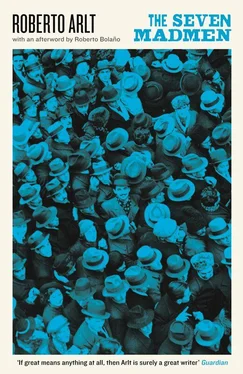She increasingly thought this way, as reality tore to shreds the phantoms her imagination briefly dressed in bright colours. She could point them all out. The stiff rag doll, perfumed and stern as he went about his business, priding himself on being so grave and silent, was a lascivious cretin underneath; the small, well-mannered one, always so kind, discreet and sensible, was a slave to the most atrocious perversions; the other one, as violent as a haulier and as strong as an ox, was as clumsy as a schoolboy … so they all filed past her, all linked by that same, unquenchable desire: and all of them had at one time or another let their weary heads droop on to her bare knees; and all the time she put up with their clumsy hands, the fleeting desires that stiffened these sad dummies, she thought of life as having to go thirsty in the midst of a desert.
That’s how life was. Men were only moved to act by hunger, lust or money. That’s how life was.
In despair, she even came to think that the only man who really interested her was the pharmacist. He at least had been able to rise for a few moments above the dreadful call of the flesh; but the lure of gambling had broken his mechanism, and now he lay even more in pieces than any of the other dolls.
What a life she had led! In her youth, when she had been a destitute young girl, she had known she would never have any money, nor a house filled with beautiful furniture, nor gleaming china services … and that impossibility had made her as sad then as she was now in the knowledge that none of the men she might seduce had it in him to be a dictator or a conqueror of new lands.
What dreams she had dreamt!
Some days she dreamt of a sensational encounter with a man whose talk would be of jungles and who kept a pet lion in his house. He would be a tireless lover, and she would worship him like a slave; she would take pleasure in shaving her armpits for him, or painting her breasts. Disguised as a boy, she would accompany him to ruins where giant centipedes lurk, to places where black tribes built huts in the forks of trees. But Hipólita had never found her lions, only flearidden dogs, and the most adventurous men she had met were bar-counter heroes, mystics worried about their next meal. She fled their petty lives in disgust.
As time went by, the few people she met who could have been characters from a novel proved to be less interesting than she had imagined, precisely because what made them stand out in the novel were the revolting characteristics that made them unbearable in real life. Yet she gave herself to them.
Once they were satisfied, they soon left her, as though ashamed of allowing her to see their weakness. From then on, she sank into the sterile wastes of her life as if she were wandering through a familiar desert of sand.
It was as impossible to transform men’s souls as it was to turn lead into gold.
How often had she collapsed naked into the arms of a stranger and whispered to him: “Wouldn’t you like to go to Africa?” At this, the man would leap up as if he had been lying next to a rattlesnake. Hipólita ended up feeling that these bodies, with their muscles and their splendid bone structures, were in fact weaker than little children, more frightened than the babes in the wood.
At the same time, she detested women. She saw how everywhere they prostrated themselves beneath male passion, then went around displaying their hideously swollen bellies. They seemed born to suffer: they were a race of tired people, sleepwalking phantoms that reeked of the earth in their gravid somnolence, like huge slow-moving monsters from prehistoric times. To see them all weighed down in shackles like that crushed her soaring soul. Hipólita would have liked to live in a less dense universe, one as light as a soap bubble, defying gravity. She imagined how happy she would be if she could skip along all the paths of the world changed to suit her desire, if she could turn each passing day into a game that would make up for all those she had never played in her childhood.
When she was little, everything had been denied her. She recalled that as a child, one of her fondest dreams had been that if only she could have wallpaper in her room she would be happy.
In hardware stores she had seen rolls of wallpaper that — to her impoverished imagination — looked like a guarantee of bliss for anyone who surrounded themselves with it; wallpaper that was like bringing the enchanted wood to a house, with its whorling, fantastic blue flowers on golden backgrounds. This seven-year-old dream was every bit as intense as the illusion when she was a maid that happiness would come from owning a Rolls-Royce. Its leather upholstery was no more precious in her mind than the equally impossible wallpaper at sixty cents a roll.
Her mind strayed to former times. Sitting with Erdosain’s head on her lap, she remembered Sunday afternoons when the sky suddenly turned stormy and a gust of cold wind sent the family scurrying in from the garden to the drawing-room. The rain would beat on the window-panes as she sought refuge in the gleaming, spotless kitchen, the voices of the visitors reaching her from distant rooms as the women chattered and the young girls leafed through magazines, pausing to look at the photos of society weddings, or played the piano.
She meanwhile sat at her table twisting the tip of her apron in her fingers, bending forward to catch the sounds, which always seemed sad to her even when they were talking of pleasurable topics. She felt as excluded as a leper from happiness. The piano music brought her images of different worlds, of mountain hotels, where she would never be the newly-wed who came down on the arm of her handsome spouse to dinner, with its warm chink of china, and birds fluttering outside windows that gave on to a splendid waterfall. Legs crossed, she twisted the tip of her apron between her fingers, head down as she listened.
She would never have a husband like Marcelo in a popular novel, nor spread her shawl over the velvet hand-rail of an opera box, while diamonds glittered in duchesses’ ears, and violins scraped softly in the orchestra pit.
Nor would she ever be one of those young married women she was used to serving, women tenderly spoilt by their husbands as pregnancy swelled their aching stomachs. And sorrow spread through Hipólita like darkness through the twilight.
“To be a servant … always a servant!” At this, her anguish became tinged with anger: her brow felt heavy, her red eyelashes closed in resignation.
Sounds of the piano from the drawing-room took her dreamy imagination through a succession of countries; Hipólita imagined that the young ladies’ education must make their minds more beautiful and desirable for their suitors. Her head was as heavy as if her skull had become a helmet of lead bones.
Everything around her, from the pots and the stove, the spotless kitchen shelves to the bathroom mirrors or the red lampshades, seemed to her so valuable she would never be able to afford anything like them; everything, from dishcloths to carpets to the children’s tricycles, seemed to her to be there to bring happiness to people made from some different stuff.
She even thought the girls’ clothes, the fine materials they used to adorn their precious bodies with, their lace and their ribbons, must be totally different from whatever she was able to buy for the same money. This feeling of living for a short while with people who inhabited a world separate from her own left her in dismay, to the point where despair was as plain as a blotch on her face.
What could she possibly be except a servant, always a servant!
An obscure refusal gradually took shape in her heart, a response to the invisible phantom that was consuming her with rage. Her life became one long resistance to domesticity. She did not know how she was going to escape from this chain of unhappiness, but she never failed to tell herself that this was only a passing phase, even though she had no idea what was going to become of her. She spent days observing the way the girls of the house behaved; she studied the way they moved their heads, how they said goodbye to their friends at the door; later on in front of her mirror she imitated what she remembered of their gestures. And for a few short hours, these imitations in her cramped lonely room left on her lips and in her mind the sensation of being one of them, of being every bit as precious as they were — so that she rejected her own previous clumsy way of being, as if she had grown out of it now she had assumed her true personality as a refined young lady.
Читать дальше











